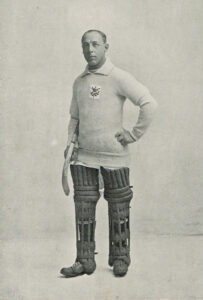France attempted to get their cross channel opponents Great Britain drunk in Antwerp the night before the men’s gold medal match at the 1920 Olympics, exactly 100 years ago, but were thwarted in their attempts thanks to their rivals being made of “sterner stuff”.
The story has been thrust into the limelight ahead of a special anniversary event at The Hockey Museum in Woking on Saturday following painstaking research into GB caps which will see the family of goalkeeper Harry Haslam receive an international cap.
Haslam is being designated as cap number one in the museum’s list and the presentation will be followed up next May when the current players are handed their modern day cap number ahead of the Euros and the Olympics. The Hockey Museum’s work should be much applauded.
Great Britain’s gold medal at the 1920 Antwerp Games certainly came under strange circumstances, “arising from a misguided piece of skulduggery,” according to the museum.
Only four nations competed at the Games – Denmark and Belgium the other teams – and after a series of round robin matches, the gold medal was won by virtue of a walkover to GB after France failed to take to the field for the final.
“The story of the way the Brits won the gold medal is absolutely brilliant,” Harry’s grandson, John Ottaway, told The Hockey Paper.
“The gold wasn’t made very much of when we were kids, it wasn’t thought as any great shakes. They had all decamped for a weekend and no one had given them any kit. They had turned up, won the gold medal and come home so I’m not sure Harry had the same elevated opinion on what he had done as we have now.
“But the French were on a hiding to nothing and decided that the best way to win the match was to take the Brits out and get them drunk. It sounds a bit apocryphal but they certainly didn’t turn up the next day!”
The Ilford Recorder, in an article on Harry, whose club was Ilford HC, described the affair in 1996. “Great Britain’s opponents invited our lads out on the town – with the intention of drinking them legless.
“The French found their opponents were made of sterner stuff than themselves in the hangover league and the inebriated opposition actually conceded the next day’s final following their mutual night out on the town.”
 Another source, also penned many decades later, refers to an epidemic near the French team’s accommodation, the Games taking place two years after the First World War and Spanish Flu still rampant in Europe.
Another source, also penned many decades later, refers to an epidemic near the French team’s accommodation, the Games taking place two years after the First World War and Spanish Flu still rampant in Europe.
“This may of course be a tactful way of suggesting the French team were the worse for wear, or it could be sincere,” the museum said. The French finished last after losing their other two games.
The family hasn’t been able to put any bones on the story but the Recorder piece could have solid grounding as Harry was also a local reporter for the paper.
He had started life playing hockey in Birmingham before coming down south with his brother, who was also a goalkeeper, before settling in Essex.
He won nine international caps in all, making his England debut aged 37. According to the museum’s research, Harry’s style of play “was apparently on a par with his ability to hold his drink and he was noted for his eccentricity on the pitch.”
A newspaper match report in 1912 stated that Haslam “made several brilliant saves but, for some unaccountable reason, accompanied each effort with a ‘whoop’ like a proverbial scalp hunter.”
During First World War he served as a chief inspector with the Metropolitan Special Constabulary and in 1920 he received an OBE for his services to the constabulary.
He retired from playing hockey at the age of 48 in 1932 and ran a weekly radio broadcast on the BBC where he parted his hockey knowledge. He was also a keen adminisrator and the meeting minutes from the Essex league showed he was quite outspoken.
It is believed that Harry was also instrumental in bringing in the new stick design. The English hockey stick used to be a semi circle and at the time the sport realised that the Indian style half-crescent stick was a far more efficient style of playing.
Harry died unexpectedly on his 72nd birthday in 1954. He had umpired a match only a few days before.
Editor’s message
For us to continue to provide quality hockey news, we are asking you to subscribe to our newspaper in print or digital.
The pandemic has had a major impact on our advertisers and our business as we aim to keep bringing you the best hockey coverage and we are more reliant on subscriptions than ever before.
We have continued to keep up news and views since lockdown with no advertising and so we are asking readers to help keep supporting us.
Does your club have interesting news or features? Email us!
Help keep independent journalism alive in these uncertain times. Ahead of the new season, please subscribe in print or in digital format.




